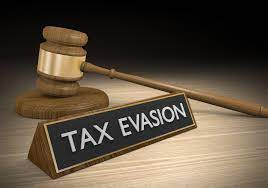The British government has decided to introduce a new tax regime for the UK which aims to make it less attractive for companies to move their headquarters from the UK. The UK is a popular place for international businesses to set up their headquarters.
This new tax regime will require companies with more than 250 employees and those with an annual turnover of over £20 million to pay a withholding tax of 20% on their worldwide profits.

UK Tax Evasion
In the UK, it is a criminal offense to avoid tax and in most cases, the penalty is up to £5 million. If you are involved in tax evasion, you must be aware that there are serious consequences attached to your actions.
The UK government has introduced a new law that enables them to prosecute individuals who have evaded their taxes by hiding money or assets abroad. This law will be enforced from April 2018 and if you are found guilty of tax evasion, your penalty could be as high as £500,000 or even more.
This is not only applicable to you personally but also to your company if you want to avoid paying any taxes at all. A lot of people are trying to avoid taxes, especially in the UK. The tax system is complex and there are many different ways to avoid paying taxes.
UK Income Tax Law
Income Tax is a complex tax system in the UK. It is the biggest tax system in the world. It has many different rules and regulations that need to be followed by UK taxpayers.
The Income Tax Act 2002 (c) defines income and capital gains as follows:
“‘Income’ means any gain, profit or other benefit derived from any source, whether directly or indirectly, including profits from the property; “capital gains” means any gain on disposal of property which is not income.”
The Income Tax Act 2005 defines capital gains as follows: “‘capital gains’ means any gain on disposal of property which is not income.” Capital gains are usually referred to as “gains from capital” or “capital gain”.
This definition covers all types of taxable income and does not differentiate between ordinary and capital gains.
Taxation In The United Kingdom
Taxation is a very important part of life, especially in the United Kingdom. It affects every single person who lives there. It is also one of the most complex taxes in the world and it can be quite complex to understand.
The tax system in the UK has a lot of ways to calculate income and wealth, so it is very important that you take your time and find out what your tax situation is before you start thinking about any changes to your finances.
The main reason for taxation in the UK is to pay for public services. The government spends 2% of its GDP on public services and this is a percentage that has not changed since 1997. The government has also increased taxes on alcohol, tobacco, and petrol in order to raise money for public services.
The tax system in the UK is complicated and it can be difficult to understand what exactly you are paying tax on. In order to help people understand taxation better, the government has created an Income Tax Calculator which allows people to input all their details and then see how much they will be taxed per year based on their annual income level (not per £1). This means that they can compare their situation with other people who have similar incomes.
In the UK, income tax is levied on individuals and corporations. In fact, income tax is one of the biggest sources of revenue for the government. The UK has a progressive income tax system with different rates and thresholds for different types of income.

However, there are also some exemptions and deductions that are available to people who can afford them.
For example, people who earn less than £10,000 per year or £15,000 for married couples do not pay any tax at all on their annual earnings. They only pay national insurance contributions (NICs) which are deducted from their earnings before they get paid out to them.
At the other end of the spectrum are those who earn more than £150,000 per year or more than £500,000 for married couples.
Tax evasion penalties in the UK: what’s the maximum?
An organization can face crippling consequences if they violate the Criminal Finances Act of 2017. Tax evasion can result in penalties of up to 200% of the tax due and even jail time if the tax is not paid. Income tax evasion, for example, can carry a sentence of up to six months in prison and a fine of up to £5,000, up to a maximum of seven years in prison and an unlimited fine. Tax evasion is punished similarly, though the fine could be as high as £20 000.
Conclusion
The following information relates to tax evasion in the United Kingdom. In order to open a business in the UK, you should have this kind of information in order to have enough knowledge about it. The act of tax evasion occurs when a person or company hides the true state of its affairs from tax authorities to avoid paying taxes. This involves the evasion of income taxes or VAT, excise duties, customs duties, etc.






